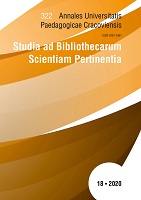Postrzeganie architektury informacji przez studentów wybranych szkół wyższych w Polsce w świetle badań ankietowychcard sorting, website, information architecture, user experience, OptimalSort, Information Portal of the Nicolaus Copernicus University
Perception of information architecture by students at selected universities in Poland in the light of a survey
Author(s): Anita Has-Tokarz, Renata MalesaSubject(s): Information Architecture, Electronic information storage and retrieval, Education and training, Higher Education , Sociology of Culture
Published by: Wydawnictwo Uniwersytetu Komisji Edukacji Narodowej w Krakowie
Keywords: information architecture; academic education; social awareness; collective awareness; social attitudes;
Summary/Abstract: This article presents research results on the social (here: students’) recognition of information architecture as an educational path, awareness of the role and importance of information architecture (Eng. IA, information architecture) in a world dominated by technology. It also reviews the knowledge of the specifics of this subject matter as well as the perspectives, skills and job opportunities stemming from academic training in this discipline. The research paradigm is the interpretation of “collective consciousness” proposed by Emile Durkheim (The Division of Labour in Society, 1990), who sees it as a collection of widely distributed and accepted views, ideas and beliefs that are becoming patterns or blueprints for thinking in a particular society. Collective consciousness is a process by nature, it crystallizes over time as a result of individual experiences and environmental influences. This article presents the results of a survey conducted among students of two faculties of the Maria Curie-Skłodowska University in Lublin and (for contrast) students at the Military University of Technology in Warsaw. The research includes comparative analysis on identifying possible differences in perceiving IA by students of this course, those studying other areas of humanities and social sciences, such as media production, German studies, Portuguese studies, Italian studies, as well as students of hard sciences, i.e. computer science.
Journal: Annales Universitatis Cracoviensis. Studia ad Bibliothecarum Scientiam Pertinentia
- Issue Year: 2020
- Issue No: 18
- Page Range: 303-320
- Page Count: 18
- Language: Polish

